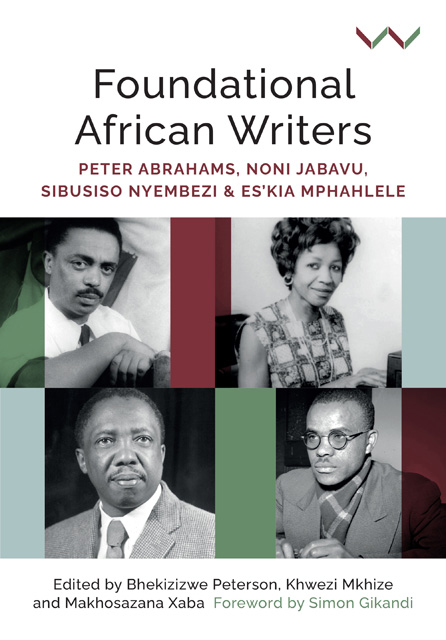Book contents
- Frontmatter
- Contents
- List of illustrations
- Foreword
- Acknowledgements
- Tribute to Professor Bhekizizwe Peterson
- Introduction
- Part I Remapping and Rereading African Literature and Cultural Production
- Part II South Africa and Fugitive Imaginaries
- Part III In the Eye of the Short Century: Diaspora and Pan-Africanism Reconsidered
- Contributors
- Index
13 - ‘African Contrasts’: Noni Jabavu’s Travelogue as Kaleidoscope
Published online by Cambridge University Press: 01 September 2022
- Frontmatter
- Contents
- List of illustrations
- Foreword
- Acknowledgements
- Tribute to Professor Bhekizizwe Peterson
- Introduction
- Part I Remapping and Rereading African Literature and Cultural Production
- Part II South Africa and Fugitive Imaginaries
- Part III In the Eye of the Short Century: Diaspora and Pan-Africanism Reconsidered
- Contributors
- Index
Summary
Living and writing in transit
Travel which has been my lot because of circumstances beyond my control doesn’t broaden the mind much. It confuses it.
—Noni JabavuTravelling is an education in itself if the traveller is a person … ready to learn from the new and unfamiliar.
—D.D.T. JabavuWithin less than a decade, Davidson Don Tengo (D.D.T.) Jabavu, writer, academic, politician and Methodist lay preacher, and his daughter Helen Nontando (Noni) Jabavu, writer, editor and columnist, both published travelogues. D.D.T. Jabavu published his observations of his 1949−1950 trip to India and his stopovers in Kenya and Uganda in isiXhosa, first in parts in Imvo Zabantsundu (African Opinion), the paper that his father, John Tengo Jabavu, had founded in 1884, and then in 1951 in book form, as E-Indiya nase East Africa, published by Lovedale Press. Noni Jabavu published Drawn in Colour: African Contrasts in English with the London publisher John Murray, in 1960. I read their narratives as travelogues because, in keeping with the conventions of the genre, E-Indiya nase East Africa and Drawn in Colour recount the various legs of their journeys via several modes of transport and a series of lodgings and geographical terrains, whose flora, fauna and inhabitants’ customs they describe in the manner of ‘unobtrusive sojourner[s]’. Both travelogues contain reflections on East Africa, and Uganda in particular. The echoes of her father’s perspective are present in Noni Jabavu’s own narrative and I will show how Drawn in Colour, amongst the many conversations it convenes, is also engaged in an intergenerational conversation. Both exceptionally well-travelled, father and daughter employ this genre to make claims about ways of being African in the world, and in the process they draw on local and global cultural repertoires.
In part, these various conversations are prompted by Noni Jabavu’s complex positionality in relation to different cultural repertoires: like an ethnographer, she explains Southern and Eastern Africa to her European readership (in her acknowledgements she thanks her British friend, the Countess of Clarendon, who urged her to ‘write it all down’);
- Type
- Chapter
- Information
- Foundational African WritersPeter Abrahams, Noni Jabavu, Sibusiso Nyembezi and Es'kia Mphahlele, pp. 279 - 300Publisher: Wits University PressPrint publication year: 2022

